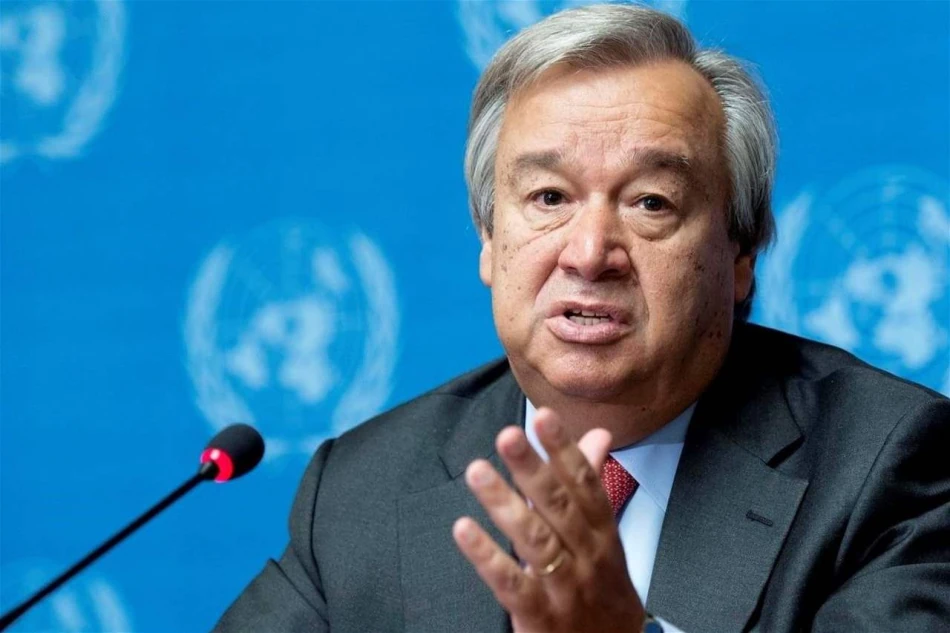
UN Chief Warns of Ongoing Humanitarian Crisis in Gaza, Urges Action
UN Chief Delivers Scathing Rebuke Over Gaza Crisis, Calls International Response "Immoral"
UN Secretary-General António Guterres delivered one of his most pointed criticisms yet of the international community's response to Gaza, describing the ongoing humanitarian crisis as "immoral" and challenging global conscience. Speaking to Amnesty International's World Assembly in Prague, Guterres painted a devastating picture of starvation, desperation, and institutional failure that signals a potential breaking point in multilateral diplomacy.
Unprecedented Scale of Human Suffering
Guterres emphasized that while he condemned Hamas attacks from October 7, 2023, nothing justifies the continued "explosion of death and destruction" that followed. The scale and scope of events, he argued, surpass anything the international community has witnessed in recent memory.
The UN chief's most striking revelation centered on children in Gaza expressing wishes to "go to heaven because at least there they will find food." This stark testimony underscores how the crisis has moved beyond traditional humanitarian metrics into existential desperation.
According to UN data cited by Guterres, over 1,000 Palestinians have been killed since May 27 while attempting to obtain food—not in combat, but during desperate searches for sustenance amid widespread starvation.
Institutional Breakdown and International Paralysis
Guterres expressed bewilderment at what he termed the "indifference and inaction" of much of the international community, describing a complete absence of "mercy, truth, and humanity." This represents a significant escalation in his criticism of member states, suggesting deep frustration with diplomatic gridlock.
The Secretary-General noted that UN staff themselves are starving "before the eyes of the world," describing conditions so unimaginable that personnel feel "drugged and exhausted to the point where they don't know if they're dead or alive."
Implications for UN Credibility
This level of public criticism from a sitting UN Secretary-General is rare and signals potential institutional crisis. Guterres acknowledged that "words don't feed hungry children," effectively admitting the limitations of diplomatic rhetoric in the face of humanitarian catastrophe.
Broader Battle for Human Rights Architecture
Beyond Gaza, Guterres framed the crisis within a larger "global battle for human dignity and human rights," pointing to rising authoritarian tactics worldwide that undermine respect for international law. He specifically highlighted attacks on institutions like the International Criminal Court, suggesting coordinated efforts to dismantle the post-World War II international order.
The UN chief called attention to what he termed the "flood of lies and hatred polluting digital space," identifying social media manipulation as a powerful weapon in authoritarian hands. This connects Gaza's information warfare to broader global trends of democratic backsliding.
Strategic Positioning and Next Steps
Despite his criticism, Guterres positioned the UN as ready to maximize any potential ceasefire to dramatically expand humanitarian operations across Gaza, referencing successful previous truces. He outlined specific demands: immediate permanent ceasefire, unconditional hostage release, unimpeded humanitarian access, and concrete steps toward a two-state solution.
His reference to the International Court of Justice's recent advisory opinion suggests the UN will increasingly rely on legal mechanisms to pressure member states, potentially bypassing traditional diplomatic channels that have proven ineffective.
Climate Justice Connection
Notably, Guterres linked Gaza accountability to climate justice demands, suggesting a broader strategy to connect humanitarian crises with environmental governance—potentially expanding pressure on reluctant nations across multiple policy fronts.
This comprehensive critique represents either a calculated gambit to shock the international system into action or acknowledgment that traditional UN diplomacy has reached its limits in addressing systematic violations of international humanitarian law.
Most Viewed News

 Sara Khaled
Sara Khaled






